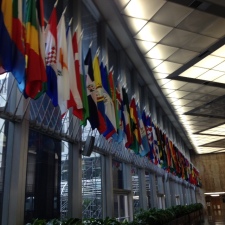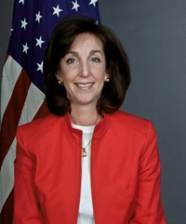Normalizing U.S./Cuban relations a mix of nitty-gritty and key principles by Marjorie Arons-Barron
The entry below is being cross posted from Marjorie Arons-Barron’s own blog.
I just returned from State Department briefings for editorialists from across the country and posted the following to the website of the Association of Opinion Journalists, just one of several key issues covered in Monday’s day-long sessions.
 The announcement of a changed relationship between Cuba and the United States is not a kumbaya moment. There’s much work to be done to allay distrust on both sides. But the commitment to normalize the relationship announced December 17 both by President Obama and Cuban President Raul Castro is a game changer. That’s the message to be drawn from Assistant Secretary of State Roberta Jacobson’s remarks to AOJ participants in Monday’s briefings at the State Department.
The announcement of a changed relationship between Cuba and the United States is not a kumbaya moment. There’s much work to be done to allay distrust on both sides. But the commitment to normalize the relationship announced December 17 both by President Obama and Cuban President Raul Castro is a game changer. That’s the message to be drawn from Assistant Secretary of State Roberta Jacobson’s remarks to AOJ participants in Monday’s briefings at the State Department.
State Dept. photo
Jacobson, who heads the Bureau of Western Hemisphere Affairs, conceded, “There’s distrust there, on their part and on our part. We have to understand how we’re going to operate. We don’t want to go down the road and find out that we’ve misunderstood each other.” “But,” she added, “we’re going to get there. That’s inevitable at this point.”
The first challenge to getting “there” is setting up an embassy. For that, Jacobson said, “there is a floor below which we will not go.” She was referring to a threshold in operations and procedures to be acknowledged by the host country, requirements largely covered by the Vienna Convention. (The Vienna Convention spells out the terms of diplomatic immunity, staffing levels, respecting the confidentiality of diplomatic communications, and freedom from harassment or prosecution. Diplomats’ families are covered as well.)
“After so many years without this kind of conversation, it has taken longer for the Cubans to come around to things that are standard elsewhere. It’s not going to look like our embassy in London, but it has to look like many embassies in other places around the world that may be fairly restrictive, but we have to be able to work under what we perceive to be the rules under the Vienna Convention and our own law.”
Pressed on whether the United States had given away too much without getting anything in return, Jacobson “nothing has been given away.” The only specific “deal” in last December’s announcement was the spy exchange, in which three Cuban agents held by the United States went home, and one U.S. “asset” was released. The release of Alan Gross was on humanitarian grounds and outside the spy exchange. Jacobson further noted that removing Cuba from the list of states sponsoring terrorism was not a condition of normalizing diplomatic relations. Cuba, she noted, has said on the record that it was such a condition and also that it was not. Either way, she said, a review was timely.
Jacobson acknowledged that, given the history of foreign powers exploiting Cuba for centuries, it’s understandable that this island nation the size of Arkansas wants its culture to be respected as the move toward normalization goes forward. “We need to be sensitive to history,” she said, knowing that there is a fundamental difference between our political systems and how we organize our economies. “
The most important thing is for people to understand and respect Cuba’s national heritage. “But,” said Jacobson, “there are also international rights and responsibilities to which we have both signed up that have to be respected.” That is not now the case. “When you recognize the UN Universal Human Rights declaration and its institutions (the Human Rights Council), with that comes an acceptance of those universal human rights, which they’re not implementing.”
Jacobson made it clear. “There are things that are universal standards and there are things that are uniquely and justifiably and proudly Cuban, and those ought to be able to coexist.”
Jacobson has no problem with Chinese investments in Cuba, as long as China is playing by international rules, including using an open bidding process, using local labor and following environmental standards. “That’s fair, and we’d have no problem competing in such a situation.” Eyes wide open, the United States will keep “a close eye on them for playing by the rules and for when, and if, their interests in the region spill out beyond the economics.”
As I wrote upon my return from Cuba in March, distrust is the biggest obstacle to successfully normalizing relations between the United State and Cuba. Some distrust is rooted in history. The Bay of Pigs fiasco, the Cuban missile crisis, the Soviet presence, Cuba’s embrace of the Palestinian cause and anti-Israel posture, Cuba’s exporting soldiers to Angola and involvement in Latin Americans revolutions, its restrictions on journalists and treatment of political prisoners, all are part of that history.)
For most of the generation in their ’40’s and ’50’s, on both sides, these are dim memories and relics of the Cold War. Yet for more than half a century, we have been mired in the rhetoric of the past. What Presidents Obama and Castro did on December 17, 2014 was to change the tone. Consistent with that, Jacobson seems to be going in with her eyes wide open, dealing with the prosaic nitty-gritty of normalizing relations. The change may indeed by inevitable, but it will inevitably come slowly.
